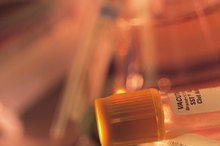What Is a CBC With Auto Diff Blood Test?
"CBC with Auto Diff" is medical shorthand for the Complete Blood Count and Automated Differential Count. This group of tests is part of a routine health checkup. It is also the first blood test ordered for diagnosis of an illness 1.
If you are experiencing serious medical symptoms, seek emergency treatment immediately.
Complete Blood Count (CBC) and Differential Count
The CBC is a series of lab tests that measure the amount, shapes, and sizes of red and white blood cells in a sample. The CBC is routinely ordered during annual physicals and other routine checkups, as it is an inexpensive and easy test to run that provides a lot of information about the patient's health. The CBC is also used to diagnose various illnesses. The differential count measures the different types of white blood cells and compares their amounts to the total count. It is usually done by a machine (automated differential) but it can be done by a technologist who hand-counts the cells using a microscope (manual differential).
- The CBC is a series of lab tests that measure the amount, shapes, and sizes of red and white blood cells in a sample.
- The CBC is routinely ordered during annual physicals and other routine checkups, as it is an inexpensive and easy test to run that provides a lot of information about the patient's health.
Red Blood Cell (RBC) Tests
What Is a Biometric Screening?
Learn More
Several tests that measure the status of RBCs are included in the CBC. The RBC count measures the number of RBCs in one cubic millimeter of blood. Hematocrit measures the percentage of total blood volume that consists of RBCs. The hemoglobin concentration measures the quality of RBCs in terms of their ability to carry oxygen. The RBC indices provide more information: mean corpuscular volume (MCV) and red blood cell distribution (RDW) measure the size of the cells, mean corpuscular hemoglobin (MCH) measures their weight, and mean corpuscular hemoglobin concentration (MCHC) measures the hemoglobin concentration. The results of these lab tests give a good picture of the health of the RBCs.
- Several tests that measure the status of RBCs are included in the CBC.
- The RBC count measures the number of RBCs in one cubic millimeter of blood.
White Blood Cell (WBC) Tests
The WBC count has two parts. The first is a total count, which measures the number of WBCs in one cubic millimeter of blood. The second is the differential count, which measures the number and percentage of each type of WBCs present in the specimen. There are five main types of WBCs measured by the differential: neutrophils, lymphocytes, monocytes, eosinophils, and basophils. Each has a different role in the immune system of the body. Increases and decreases in any of these numbers can be used to diagnose many common conditions.
- The WBC count has two parts.
- The first is a total count, which measures the number of WBCs in one cubic millimeter of blood.
Platelet Count
Absolute Eosinophils Levels
Learn More
The platelet count is a measure of the number of platelets (thrombocytes) per cubic millimeter of blood. Platelets are involved in clotting of the blood. This test is not always part of the general CBC with differential, but will be ordered in any patient who is having issues with bleeding, clotting, or bruising.
- The platelet count is a measure of the number of platelets (thrombocytes) per cubic millimeter of blood.
- This test is not always part of the general CBC with differential, but will be ordered in any patient who is having issues with bleeding, clotting, or bruising.
Blood Smear
A blood smear is the microscopic examination of a sample of the patient's blood by a technologist. Counts of RBCs and WBCs are performed, and the technologist looks carefully for variations in size and shape among the visible cells. This test is not generally part of the routine CBC, but will be ordered in cases where blood disorders are suspected. It is also a routine followup to a CBC with a differential count or RBC indices that are outside of normal limits.
- A blood smear is the microscopic examination of a sample of the patient's blood by a technologist.
- This test is not generally part of the routine CBC, but will be ordered in cases where blood disorders are suspected.
Related Articles
References
- Mosby's Manual of Diagnostic and Laboratory Tests; Kathleen D. Pagana and Timothy J. Pagana; 1998
- Teferri A. Prognosis and Treatment of Essential Thrombocythemia, Prognosis of Primary Myelofibrosis and Management of Primary Myelofibrosis, and Prognosis and Treatment of Polycythemia Vera. In: UpToDate, Post TW (Ed), UpToDate, Waltham, MA. 2016.
Writer Bio
Stephanie Draus is a naturopathic doctor and assistant professor of clinical sciences at National University of Health Sciences. She has practiced in Chicago as a health consultant since 2005. She is a graduate of the National College of Natural Medicine in Portland, Oregon.









